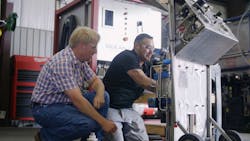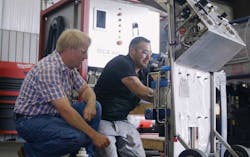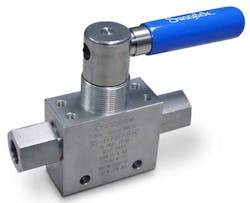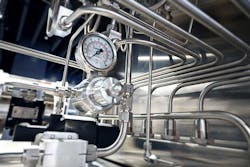Medium-Pressure Ball Valves Provide a Rugged Solution
After working on large subsea offshore oil and gas drilling projects for several decades, Santiago Gomez, president for Ocean Edge Services, believed he had learned the nuances of the complex processes involved, including the need for more effective hydraulic power units (HPUs). Past iterations of the equipment had flaws in their design, so instead of simply purchasing a new unit when his company needed one, Gomez decided to build his own HPU. By redesigning the unit from the ground up, he hoped to use his knowledge and firsthand experience to make a better HPU than had previously existed.
Gomez realized he needed support when taking on this task. He called longtime colleague Jeremy Rogers, CEO for Ocean Edge Services, who reviewed a rough sketch of what Gomez had in mind and immediately committed to helping him. Together, they formed a company called Ocean Edge Services (OES) with a singular focus: creating rugged equipment for the oil and gas drilling industry with the end-user in mind.
But to build equipment that was significantly better than what had come before, they needed to find a partner who could supply them with components that would improve safety and reliability and reduce the assembly time of their HPUs. To achieve that, they turned to Swagelok.
Withstanding the Pressure
OES designs HPUs that allow for the remote control of offshore oil and gas platform production, which means the components are under immense pressure—somewhere between 20,000 and
60,000 psi. That amount of pressure is necessary to force the hydraulic actuation of equipment from the topside of oil and gas platforms to the sea floor. Performance under those conditions is challenging, and each component, from the pumps to the connections, must work as intended to keep operators and the environment safe.
To improve the safety profile of their HPUs, Gomez and Rogers wanted to remove vibration from the system. Vibration poses a serious risk to drilling components because it can affect connections, causing them to wear, slip or blow out. When any of those problems occur, they can lead to unplanned maintenance and accidents.
When they looked closely at previous HPUs, Gomez and Rogers focused on the medium-pressure ball valve and the use of a compression-end connection. Offshore applications have required cone-and-thread connections to withstand the pressure necessary to execute the operation, but they require the addition of a vibration gland to minimize potential vibration damage. These glands must be installed by a knowledgeable and experienced technician to ensure they work properly, adding another level of complexity to an already complex situation.
Cone-and-thread connections also tend to loosen over time when subjected to vibration and must be tightened manually to ensure leak-tight connections. Gomez and Rogers realized there was a significant opportunity to improve their HPUs by investing in medium-pressure ball valves with tube fitting end connections instead of traditional cone-and-thread connections.
The advanced design of the ball valve Gomez and Rogers chose reduced seal wear and improved the reliability of connections across a full range of operating pressures up to 20,000 psi as well as temperatures. The trunnion-style ball features an innovative direct-load design to enable leak-tight performance and a bottom-loaded stem design to eliminate stem blowout.
Before they decided to commit to using the medium-pressure ball valves in their units, OES had to do its own rigorous testing to ensure they would perform as promised. They found the valve operated smoothly with 100% differential, indicating one side of the valve received all the force while the other side saw none.
Gomez and Rogers found the valve outperformed expectation—while it was rated for 15,000 psi, it held all the way to 22, 000 psi. In addition, the valves acted like an antivibration unit, making it the perfect valve to eliminate vibration as the team at OES hoped to do.
Improving Productivity and Reducing Costs
Eliminating vibration was only part of the equation, since Gomez and Rogers also hoped to reduce the installation time and maintenance required for the HPU under grueling conditions. In the field, OES discovered that assemblers could complete installations with the tube fitting end connections five times faster than those with the traditional cone-and-thread end connections. For the end-user, that reduces rework after the HPU is delivered and lowers the long-term maintenance costs.
The assembly process was less complex, which means technicians made fewer mistakes. That leads to more consistent, reliable performance over the HPU’s lifetime. Finally, preparing the valve for installation is five times faster with the medium-pressure ball valves using tube fitting end connections over the traditional cone-and-thread connections.
The Swagelok Company provided this case study. The original version of this article appeared on the Swagelok Reference Point blog.
This article also appeared in Machine Design.




